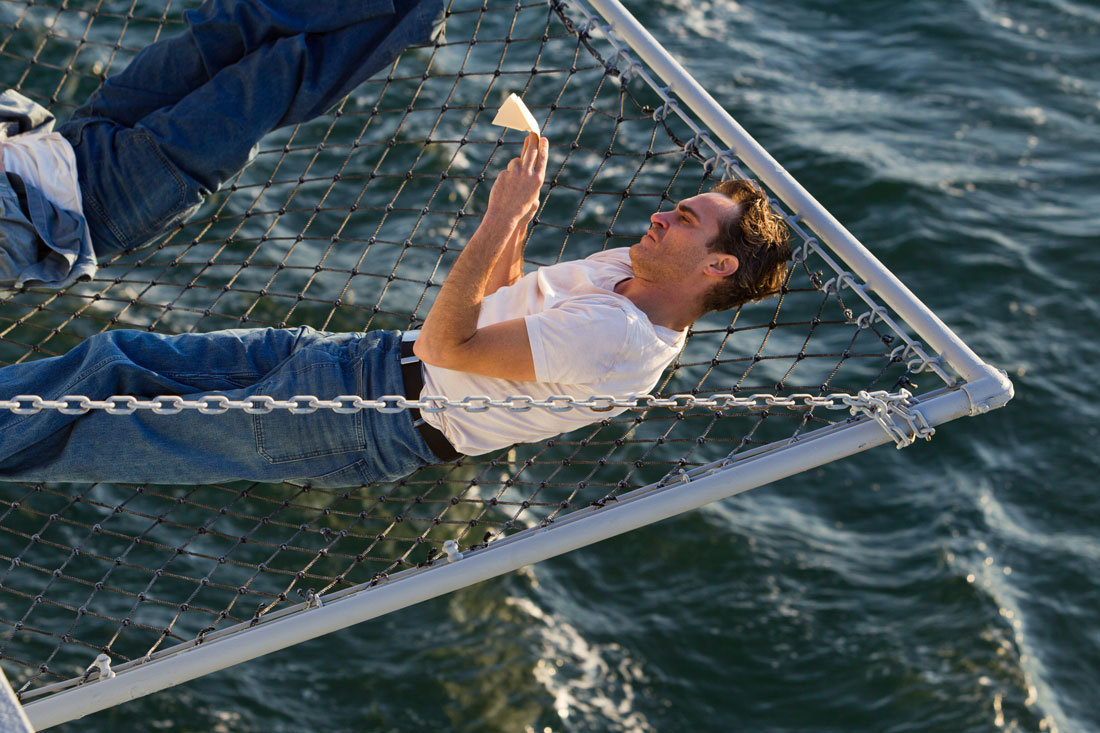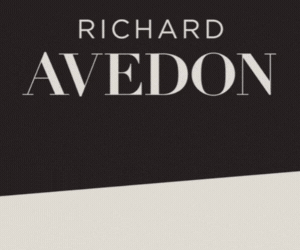Bear with me here. I write this review a scant hour or so after watching Paul Thomas Anderson’s The Master, and like most of Anderson’s films, it tends to resist straightforward analysis. As with Anderson’s previous work, There Will Be Blood, I knew while watching this big, ambitious drama that I was in the presence of a filmmaker with superhuman command of the tools of cinema. Impressed though I was, I also spent large chunks of time trying to figure out what the hell he was on about. I think I may have an answer.
Our main character is Freddie Quell (Joaquin Phoenix), a Navy sailor who’s in a bad way as World War II ends. He can’t hold down a job because of his fits of unprovoked temper and because his alcoholism is so far gone that he’s mixing cocktails with turpentine and photography chemicals.
In dire need of spiritual guidance, Freddie finds it in 1950 when he passes out on a passenger ship that happens to be transporting Lancaster Dodd (Philip Seymour Hoffman) and a few dozen of his family members and followers. Grandiloquently describing himself as “a writer, a doctor, a nuclear physicist, a theoretical philosopher, but above all … a man,” Dodd is the founder of The Cause, a quasi-religious movement that aims to perfect the human race and end war, poverty, hunger, and disease by “dehypnotizing” people and inducing them to remember their past lives.
Much of the publicity about The Master has been about whether it’s really talking about Scientology. Despite a few surface similarities between Scientology and The Cause (and between Dodd and L. Ron Hubbard), the story is more about the behavior of cults in general. The Cause is very much a cult whose leaders brook no argument and cast even mild dissenters as mortal enemies. Freddie becomes an enthusiastic proponent of The Cause, but he is always an odd fit because of his ragged background and his problems obeying authority. His presence unsettles the other members, especially Dodd’s die-hard loyalist wife Peggy (Amy Adams).
The three leads give gigantic performances here, which is a regular feature of Anderson movies. You wouldn’t expect Adams, with her petite frame and her powdered-sugar voice, to be cast as an ideological enforcer, but she makes a thoroughly credible one. Her eyes pool with compassion as Peggy tries to help Freddie kick his alcohol addiction, but she turns rock-hard when he starts causing trouble. Hoffman is near the top of his game, and that’s a stratospheric height indeed. His Dodd has a twinkling sense of humor and a hearty laugh that coexists with a possessive streak that impels him to make his followers into his creatures — watch the great late scene in which he tries to woo Freddie back by crooning “Slow Boat to China.” As for Phoenix, he hasn’t acted much recently apart from turning himself into a trainwreck for the purposes of I’m Still Here, but this performance finds him recapturing the volcanic unpredictability of his work in the 1990s.
The director’s visuals are meticulous, and composer Jonny Greenwood uses massed strings to great quivering effect in his score. Yet even though its details are placed just so, the movie never feels overly put together, because there’s a typically Andersonian core of boiling anger at the heart of this thing. This comes to the fore in a full-roar exchange midway through the film when a disillusioned Freddie and a self-righteous Dodd hurl accusations at each other through the bars of their adjoining jail cells, a scene punctuated by Freddie smashing his cell’s toilet and ramming his head against the underside of the bunk bed. That scene is tightly edited and lethally sharp, qualities it shares with the film’s other bravura set pieces. There’s the montage in which Freddie’s drying out at the cult’s hands doubles as a series of brainwashing sessions and an early encounter when Dodd, by asking a few preset questions, manages to lay Freddie open and get him to reveal the extent of his horrible childhood. That latter bit makes you believe in the hold that this cult leader has over his flock.
The Master is a spiritual quest, in the end, and unlike many other such movies, this one is willing to follow its hero up the blind alleys and setbacks that frequently accompany a quest. Freddie owes much to The Cause, and yet this frequently enigmatic film ends with a shot of him in the arms of someone we suspect will be a much more benevolent influence on him. That uncertain degree of resolution is typical of the movie’s complexity, and it helps make this small-scale story feel so large.
[box_info]
The Master
Starring Joaquin Phoenix, Philip Seymour Hoffman, and Amy Adams. Written and directed by Paul Thomas Anderson. Rated R.
[/box_info]












